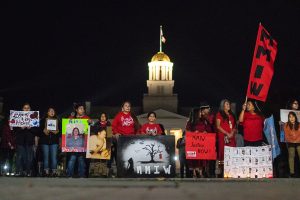Student organizations coordinate new anti-sexual assault project on campus
UISG, greek life, and the Women’s Resource and Action Center are collaborating on a new campus project mimicking recent anti-sexual assault initiative at Ohio University.
The Old Capitol building is seen in 2018.
October 8, 2018
After a tweet from the Ohio University Interfraternity Council about banners against sexual assault went viral, UISG and Fraternity/Sorority Life have decided to spark the conversation about sexual assault here with banners of their own.
The tweet published on Sept. 12 by the Ohio Interfraternity Council stated that “#MyFraternity at Ohio University means supporting survivors.” Four pictures depicting fraternity houses with banners were included in the tweet. The banners included sentiments such as “Stand with Survivors,” “Consent is bae,” “’No’ does not mean ‘convince me,’ ” and “It is not consent if they are too afraid to say no.”
The tweet received nationwide praise, accumulating more than 90,000 likes and 25,000 retweets. UI students soon caught wind of the project.
“Powerful. Fraternity men at Iowa: If you’re interested in doing this on our campus, I’d be happy to help coordinate,” UISG President Hira Mustafa tweeted in response.
A day later, Mustafa tweeted about the overwhelming response from fraternities at UI.
“Due to the strong response to Hira’s tweet, she and I have decided to make efforts & move forward with making this a project on our campus,” said Kristen Ahrens, the UISG director of communications.
She said this has now evolved into a campus project. Ahrens and Mustafa connected with Erin McHale, assistant director of Fraternity/Sorority Life Programs, to receive feedback and assistance on the initiative.
The Women’s Resource and Action Center has also expressed support.
“WRAC is helping to review and offer input on the issue of preventing and help to provide information that can guide the campus conversation. We are eager to assist in whatever way we can,” said Cody Howell, the WRAC violence-prevention specialist.
RELATED: Non-profit calls for cultural shift to prevent sexual assault, gender-based violence
Howell hopes that the project will have an impact on the culture of sexual assault, especially now.
“I believe this type of initiative, one that involves students who are speaking out against sexual violence, can really bring this issue out into the open,” he said.
The project also carries a bigger effect when student leaders, especially in fraternities, choose to spark a dialogue about the ongoing issue of sexual assault on campus, Howell said.
Two studies published by NASPA in 2007 and 2009 suggest that men in fraternities are more likely to commit an act of sexual assault in comparison with non-fraternity members. The study published in 2009, “Fraternities, Sororities, and Binge Drinking: Results from a National Study of American Colleges,” also revealed that 39 percent of fraternity members in the study sample viewed sexual assault as a problem, whereas 69 percent of sorority members said it was.
“Having leaders on campus using this platform to tell others they support survivors and that they won’t tolerate sexual assault speaks volumes about where their priorities are,” Howell said.
Though the project is still in its early stages, Howell hopes that it will affect the campus environment. The initiative possesses the opportunity to spark a change in attitude and campus safety, he said.
“I hope it really can change the way we treat survivors when they come forward,” he said. “I hope that we can begin to see our culture change to one that believes and supports survivors when they come forward.”






